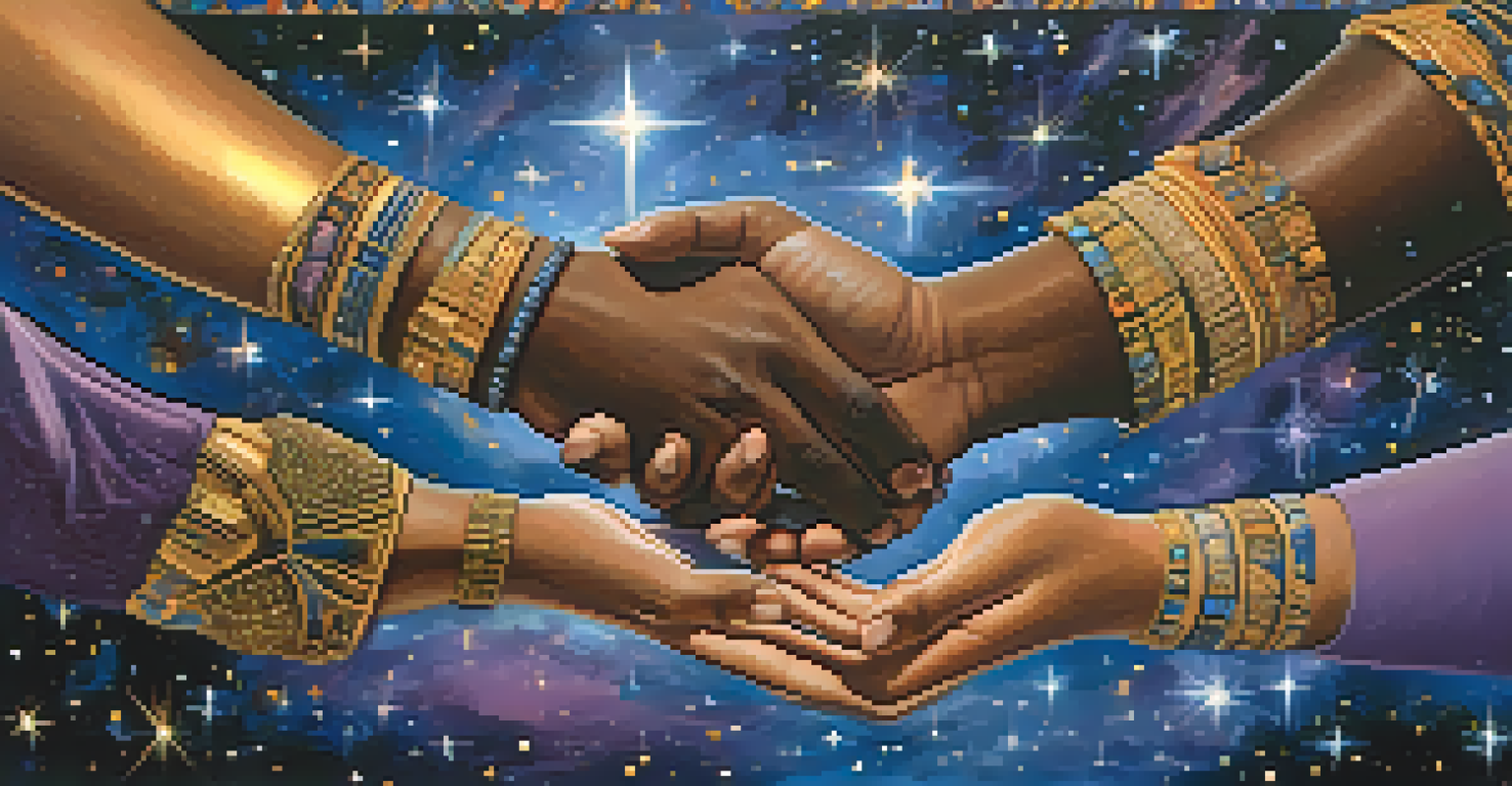Cultural Perspectives on Non-Dual Awareness and Hallucinogens

Understanding Non-Dual Awareness Across Cultures
Non-dual awareness refers to a state of consciousness where the distinction between the self and the surrounding world dissolves. This concept is deeply rooted in various spiritual traditions, such as Buddhism and Advaita Vedanta, each offering unique interpretations. In these cultures, achieving non-dual awareness is often seen as a path to enlightenment and deeper understanding of existence.
The mind is everything. What you think you become.
For example, in Buddhist philosophy, the realization of non-duality is believed to lead to the cessation of suffering. Practitioners engage in meditation techniques designed to quiet the mind and promote a sense of interconnectedness with all beings. This contrasts sharply with Western individualistic perspectives, where the self is often viewed as separate and distinct from the universe.
Thus, understanding non-dual awareness through different cultural lenses not only enriches our comprehension but also highlights the universal quest for meaning. This commonality transcends geographical boundaries and invites dialogue about our shared human experience.
The Role of Hallucinogens in Spiritual Practices
Hallucinogens have played a significant role in various cultural and spiritual practices, often being used as tools for spiritual exploration and healing. Indigenous tribes in the Amazon, for instance, utilize ayahuasca in their rituals to facilitate profound spiritual experiences and insights. This practice is rooted in the belief that the plant medicine connects users with the spiritual realm and offers guidance.

Similarly, the Native American Church incorporates peyote into their ceremonies, viewing it as a sacrament that fosters communion with the divine. The experience often leads participants to a heightened state of awareness, akin to non-dual awareness, where they feel a deep connection to nature and the universe. Such rituals are not merely about the substance used; they embody a broader cultural context and a communal approach to spirituality.
Cultural Insights on Non-Duality
Different cultures offer unique perspectives on non-dual awareness, enriching our understanding of consciousness.
By examining these practices, we can appreciate how hallucinogens are not just chemical agents but are deeply intertwined with cultural identities and spiritual beliefs. This perspective encourages a more nuanced understanding of their role in facilitating non-dual experiences across different societies.
Comparing Eastern and Western Perspectives on Consciousness
Eastern philosophies often emphasize an interconnectedness that contrasts with the more compartmentalized views prevalent in Western thought. In many Eastern traditions, consciousness is seen as a continuum, where individual ego dissolves into a larger universal awareness. This non-dual perspective fosters a sense of unity and belonging within the cosmos.
The only journey is the one within.
In contrast, Western perspectives frequently prioritize the individual self, leading to a focus on personal achievement and autonomy. While this view has its merits, it can create a sense of isolation that is often mitigated by practices like meditation and the use of hallucinogens. Many Westerners are increasingly turning to these ancient practices to explore deeper layers of consciousness and connection.
The interplay between these contrasting views opens a dialogue about the nature of reality and our place within it. By blending insights from both Eastern and Western traditions, we can cultivate a more holistic understanding of consciousness and non-duality.
The Experience of Non-Dual Awareness Through Hallucinogens
Many users of hallucinogens report experiencing states that resemble non-dual awareness, characterized by feelings of unity and interconnectedness. These experiences often lead to profound revelations about the nature of reality and the self. For instance, individuals may feel as though they are part of a larger whole, transcending their individual identity.
Such experiences can be transformative, encouraging users to reflect on their place in the world and their relationships with others. However, it's essential to approach these substances with respect and understanding, as the experiences can vary widely based on context, intent, and individual psychology. This highlights the importance of integrating these experiences with personal growth and cultural wisdom.
Hallucinogens and Spiritual Connection
Hallucinogens play a significant role in facilitating non-dual experiences, intertwining with cultural and spiritual practices.
Ultimately, the intersection of hallucinogens and non-dual awareness offers a unique lens through which to explore consciousness. This exploration invites both caution and curiosity, as we seek to understand the deeper meanings behind our experiences.
Cultural Appropriation and Hallucinogenic Practices
As interest in hallucinogens grows in Western society, concerns about cultural appropriation arise. Many indigenous cultures have long histories and sacred practices associated with these substances, which are often misrepresented or commodified in modern contexts. Understanding the cultural significance of these practices is crucial for respectful engagement.
For instance, when individuals participate in ayahuasca ceremonies led by Western facilitators without proper context, it can dilute the spiritual essence of the practice. This not only disrespects the traditions of indigenous peoples but can also lead to harmful stereotypes and misunderstandings about their practices and beliefs.
To honor these traditions, it’s essential to approach hallucinogenic experiences with cultural sensitivity and awareness. Engaging with indigenous communities, learning about their practices, and recognizing their rights can foster a more respectful dialogue and understanding of non-dual awareness.
Modern Science and the Study of Non-Dual States
Recent scientific research has begun to explore the relationship between hallucinogens and non-dual awareness, revealing fascinating insights into human consciousness. Studies using brain imaging techniques have shown that certain hallucinogenic substances can alter brain connectivity, leading to experiences that mimic non-dual states. This aligns with ancient spiritual traditions that have long recognized the potential for such experiences.
Moreover, researchers are investigating how these insights can contribute to mental health treatment, particularly for conditions like depression and PTSD. The therapeutic potential of hallucinogens suggests that they could serve as tools for personal transformation, allowing individuals to confront their inner selves and cultivate a sense of interconnectedness.
Ethics in Hallucinogenic Practices
As interest in hallucinogens grows, cultural sensitivity and ethical considerations become crucial for respectful engagement.
This intersection of science and spirituality opens up exciting possibilities for understanding consciousness. As we continue to explore these realms, we may find that the wisdom of ancient traditions and modern science can complement each other in profound ways.
The Future of Non-Dual Awareness and Hallucinogens
Looking ahead, the conversation surrounding non-dual awareness and hallucinogens is likely to evolve, reflecting changes in societal attitudes and scientific understanding. As more people explore these practices, questions about ethics, cultural sensitivity, and integration will become increasingly important. This evolution could lead to a broader acceptance of non-dual experiences as valid aspects of human consciousness.
Additionally, as research continues to uncover the benefits and risks associated with hallucinogens, we may witness a shift in how these substances are perceived and utilized in both therapeutic and spiritual contexts. The potential for these experiences to foster greater compassion and understanding among individuals could be transformative on a societal level.

Ultimately, the journey into non-dual awareness and the use of hallucinogens invites us to reconsider our relationship with ourselves and the world. By fostering open dialogue and embracing diverse perspectives, we can navigate this complex landscape with respect and insight.